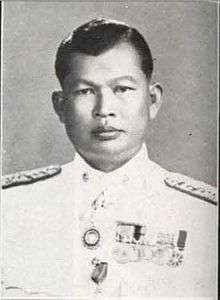Sangad Chaloryu
| Admiral Sangad Chaloryu สงัด ชลออยู่ | |
|---|---|
 | |
| Minister of Defense | |
|
In office 22 October 1976 – 20 October 1977 | |
| Prime Minister | Thanin Kraivichien |
| Preceded by | Seni Pramoj |
| Succeeded by | Lek Neawmalee |
|
In office 5 October 1976 – 6 October 1976 | |
| Prime Minister | Seni Pramoj |
| Preceded by | Seni Pramoj |
| Succeeded by | Lek Neawmalee |
| Supreme Commander of the Armed Forces | |
|
In office 1 October 1975 – 30 September 1976 | |
| Preceded by | Kris Sivara |
| Succeeded by | Kamon Dechatungkha |
| Commander in Chief of the Royal Thai Navy | |
|
In office 19 November 1973 – 30 September 1976 | |
| Preceded by | Cherdchai Thomya |
| Succeeded by | Amorn Sirigaya |
| Personal details | |
| Born |
4 March 1915 Suphan Buri, Siam |
| Died |
23 November 1980 (aged 65) Bangkok, Thailand |
| Spouse(s) | Sukon Chaloryu |
| Alma mater | Royal Thai Naval Academy |
| Profession |
Navy officer Politician |
| Military service | |
| Allegiance |
|
| Service/branch |
|
| Years of service | 1933 - 1977 |
| Rank |
|
| Commands |
Supreme Commander Commander-in-Chief of the Royal Thai Navy |
Admiral Sangad Chaloryu (Thai: สงัด ชลออยู่; RTGS: Sa-ngat Chaloyu; 4 March 1915 – 23 November 1980) was a Thai admiral and politician who served as head of the National Administrative Reform Council (NARC), a military junta that ruled Thailand from 1976-1980.
Sangad was considered to be a right-wing hawk and close to the CIA. In the 1930s as a young Naval Midshipman he had trained in Nazi Germany in radar operations. As Commander of Naval flotilla in 1954, he helped French Marines and elite forces to escape from Vietnam after Hanoi was overrun by the Vietminh. As defense minister, Sa-ngad led the coup of October 6, 1976.[3] This coup ousted the elected civilian government of Seni Pramoj. Sa-ngad became chairman of NARC, which appointed royal favorite Thanin Kraivichien as prime minister. The Tanin government instituted sweeping purges of leftists and communists. Sa-ngad was a figurehead and Army Secretary Kriangsak Chomanan was NARC's the most influential figure. NARC staged a second coup in October 1977, this time without the king's consent, and replaced Thanin with Kriangsak.[4]
Education
- Vichaibamrungraj School
- Uthai Witthayakhom
- Bansomdejchaopraya School
- Royal Thai Naval Academy
- National Defence College of Thailand
- Naval War College
Military career
- Submarine Squadron Commander
- Assistant Chief of Staff (operation)
- Commander of the Royal Thai Fleet
- Deputy Commander-in-Chief of the Royal Thai Navy
- Commander-in-Chief of the Royal Thai Navy
- Supreme Commander of the Royal Thai Armed Forces
Non-military activities
Honour
_ribbon.png)
_ribbon.png)
_ribbon.png)
| Political offices | ||
|---|---|---|
| Preceded by Choetchai Thomya |
Navy chief Nov. 19, 1973 – Sept. 30, 1975 |
Succeeded by Amorn Sirikaya |
| Preceded by Krit Srivara |
Supreme Commander of the Armed Forces Oct. 1, 1975 – Oct. 1, 1976 |
Succeeded by Kamon Dachatungkha |
| Preceded by Seni Pramoj |
Minister of Defense Oct. 5, 1976 – Oct. 20, 1977 |
Succeeded by Lek Naeomali |
References
- ↑ http://www.ratchakitcha.soc.go.th/DATA/PDF/2515/D/007/1.PDF
- ↑ http://www.ratchakitcha.soc.go.th/DATA/PDF/2519/D/002/23.PDF
- ↑ Staff report (Oct. 18, 197g). "A Nightmare of Lynching and Burning" Time.
- ↑ Kamm, Henry (October 21, 1977). "Thai Junta Ousts Civilian Regime, Charging It Delayed Vote Too Long", New York Times
- ↑ พระบรมราชโองการ ประกาศ แต่งตั้งรัฐมนตรี (จำนวน ๓๓ ราย)
- ↑ พระบรมราชโองการ แต่งตั้งสมาชิกสภานิติบัญญัติแห่งชาติ
- ↑ แจ้งความสำนักนายกรัฐมนตรี เรื่อง พระราชทานเครื่องราชอิสริยาภรณ์ (ชั้นสายสะพาย ในโอกาสพระราชพิธีเฉลิมพระชนมพรรษา วันที่ ๕ ธันวาคม ๒๕๑๐)
- ↑ แจ้งความสำนักนายกรัฐมนตรี เรื่อง พระราชทานเครื่องราชอิสริยาภรณ์จุลจอมเกล้า